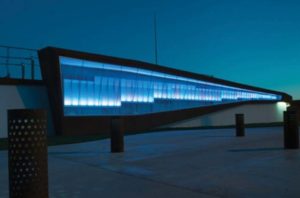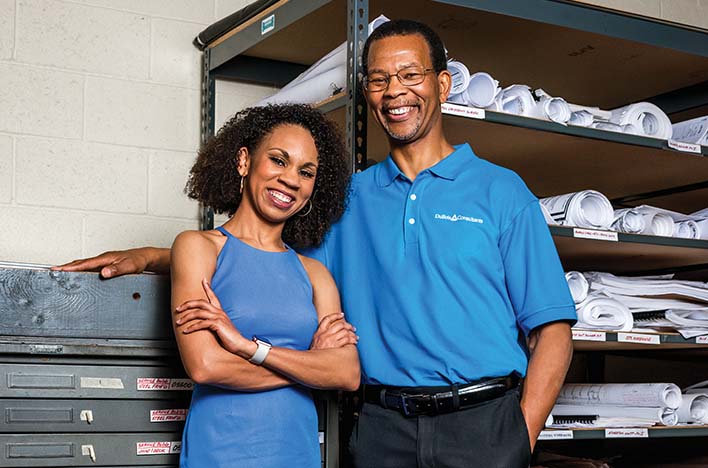Ajamu Webster had read dozens and dozens of books on business, management, strategy and leadership, but a clear path for improving the operations of his 30-year-old engineering firm eluded him.
|
ENTREPRENEUR Ajamu K. Webster, CEO, founder and structural engineer COMPANY INFORMATION DuBois Consultants Inc. 5737 Swope Parkway Kansas City, Mo. (816) 333-7700 DubConInc.com TYPE OF BUSINESS Civil and structural engineering firm that specializes in site civil and structural design for treatment plants, pump stations and underground water/wastewater infrastructure. YEAR FOUNDED 1988 EMPLOYEES 23 KEYS TO SUCCESS Honing in on a strategic focus has significantly improved the firm’s bottom line. |
Webster—CEO, founder and structural engineer at DuBois Consultants Inc.—likened his frustrations to being stuck in one of those money machines that are popular at trade shows and other marketing events. You likely know the drill: Forced air blows money around a tiny, enclosed booth as participants frantically try to grab the cash before their time runs out.
Instead of actual paper money circling his body, Webster imagined thousands of pages of information from his books swirling just out of his reach.
“I was at my wit’s end,” he said. “I had a lot of great stuff but no framework and no way to organize it.”
‘EYE-OPENING’ CLASS
That changed in 2015 when Webster attended a six-day class offered by Dartmouth College’s Tuck School of Business that was designed to help minority-owned companies build high-performing businesses. A year later, Webster attended another Tuck course that focused on helping minority-owned businesses grow.
“It was eye-opening,” Webster said. “Tuck gave me that framework and a way of organizing information and making it valuable to me. Focus had
to be part of it.”
Focus, in fact, was critical.
On the first day of the first class, Leonard Greenhalgh, professor of management at the Tuck School of Business and director of its programs for minority- and women-owned businesses, asked a simple question: What is the No. 1 reason minority-owned business don’t grow to scale?
With more than 50 business owners/students in the room, there was no shortage of opinions.
Most of them were wrong.
“Our answers were all over the place,” Webster recalled. “Lack of access to capital, poor cash flow, etc.”
But Greenhalgh, who literally wrote the book on Minority Business Success, said the main reason minority-owned businesses fail to grow is a lack
of strategic focus.
In that moment, Webster realized his company didn’t have one.
“We did whatever we could get our hands on,” he said. “It was whatever came through the door.”
DuBois did an analysis of its business and found shortcomings in its approach. Namely, it was trying to be all things to all people.
“If you have a wide variety of customers, it’s harder to meet your clients’ needs,” Webster said.
Webster pointed to pizza giants Dominoes, Little Caesars and Papa John’s to make his point.
“If you walk in their door, they will all sell you a pizza,” Webster said, “but they don’t necessarily sell to the same people.” In fact, the three chains differentiate themselves by marketing based on speed, price and quality, respectively.
“They’re optimized to deliver to their specific customers,” Webster said. “Dominoes is set up to get it out the door quickly. Speed is important. They’re judged on speed, not quality.”
SHARPENING ITS FOCUS
Webster, like those businesses, wanted to better understand his client base. What was important to them? What did they need? How were clients judging the company? And, most importantly, what should DuBois focus on?
“We wanted to determine which customers we were best suited to serve,” he said.
The analysis showed that water infrastructure projects accounted for 40 percent of the work DuBois was doing but nearly 70 percent of its revenue.
“That’s where the money was coming from,” Webster said. “A lot of other work we were doing wasn’t significantly contributing to the bottom line.”
The company adjusted its focus accordingly. Water infrastructure—such as providing structural engineering for treatment plant facilities and civil engineering services for site development, collection and distribution systems—now account for nearly 70 percent of its projects, Webster said.
“Having that focus on water infrastructure really helped us tighten down who our clients are,” said Nia Webster-Richardson, Webster’s daughter and the company’s director of business development and marketing. “We saw we had a niche there, and my job became a lot easier: Here’s our focus. We know exactly what they want. I know exactly who to go after and the amount of work to look for. It has significantly improved our bottom line.”
Although it was difficult at first, Webster said the analysis also showed the company which clients and what type of work it should decline.
That doesn’t mean DuBois won’t take on other work. The company is one of the partners involved in the new KCI project, providing structural design for the new airport’s central utility plant, terminal building foundations and superstructure as well as drainage design. The project represents the second-largest contract in the firm’s history.
Webster-Richardson said the new emphasis on water infrastructure and the KCI project have increased the firm’s 2018 revenue projections to $4 million, up from $1.9 million in 2016.
Webster-Richardson said water infrastructure projects pay better than many of the other types of work the company had taken on in the past. For example, a city government with an established system for payment, an understanding of costs and a history of working on water-related projects might be easier to work with than a church planning a one-time expansion project.
The timing of the company’s decision to focus on water was fortunate. Webster-Richardson said that roughly $18 billion worth of water infrastructure projects have been federally mandated in the region, including Kansas City, Omaha, St. Louis, Wyandotte County and communities in between.
“It’s reliable work,” she said.
PAVING THE WAY FOR OTHERS
Kansas City alone is spending $4.5 billion on the Smart Sewer program (formerly known as the Overflow Control Program, or OCP) led by Burns & McDonnell. DuBois is a partner in the project, which is in year nine of a 25-year plan.
DuBois made its mark on the Smart Sewer project by helping Burns & McDonnell and the city’s water services department evaluate the capacity and ability of local minority- and women-owned businesses to contribute to the design and construction of the project. Webster-Richardson said that work led to an expansion of the city’s Small Local Business Enterprise Program and the formation of a Smart Sewer University.
The programs are intended to help businesses gain the skills and capabilities necessary to compete for jobs locally and nationally. According the city, Smart Sewer University has provided more than 5,300 hours of training to local small, minority- and women-owned firms in Kansas City, Mo.
Webster-Richardson said the programs have provided more opportunities for such businesses to work as prime consultants or contractors on the Smart Sewer project rather than being relegated to sub-consultant or subcontractor services.
WORKING FOR CHANGE
In addition to championing small business, Webster also works to help Kansas City’s distressed communities as board chair of the WeDevelopment Federal Credit Union, which is expected to open this summer in the Linwood Shopping Center at 31st Street and Prospect Avenue.
Webster’s role in the initiative goes back nearly a decade to when he was appointed to chair a panel aimed at helping the city’s impoverished neighborhoods. One of the recommendations that panel made to the city council in 2009 was the creation of a credit union to offer residents an alternative to check-cashing business and payday loan services.
 It’s estimated that more than 40 percent of Kansas City’s black residents do not have bank accounts. Webster said the issue became personal for him when four young men came to work for DuBois on a six-month project to install water meters.
It’s estimated that more than 40 percent of Kansas City’s black residents do not have bank accounts. Webster said the issue became personal for him when four young men came to work for DuBois on a six-month project to install water meters.
“When they got their first checks, they all ran out to cash them,” he said. “My wife got a call from the check-cashing place, which wanted to verify the checks. My wife said, ‘Put them on phone.’”
Instead of using the check-cashing service, the young workers went back to DuBois, where the Websters connected them to a bank that helped them set up accounts.
“They had no concept of a bank account,” Webster said. “They had been socialized to go to a check-cashing business and didn’t see them as predatory. These young men would have been spending money they didn’t need to spend. This (credit union) will be a powerful tool in the community.”
DuBois also is trying to help people in even more dire need: students and orphans in Ghana. During a 2017 visit to a school in the West African nation, Webster asked children why they were using outhouses instead of the restrooms inside the building.
“The water didn’t come today,” a student said.
The school’s water-catch system was broken, so water had to be delivered by truck. That system proved to be unreliable, so DuBois donated funds to fix the catch system and reviewed the school’s design plans.
Webster also visited an orphanage in Ghana. Despite heavy rains in the area, the facility has no running water. DuBois is donating time to design a rainwater harvesting system to capture and treat rain water.
“If we don’t do the work we’re doing in Kansas City, someone else will do it,” said Webster, who plans
to return to Ghana in August. “It’s quite different when you put in a project that allows someone to have reliable drinking water.”


